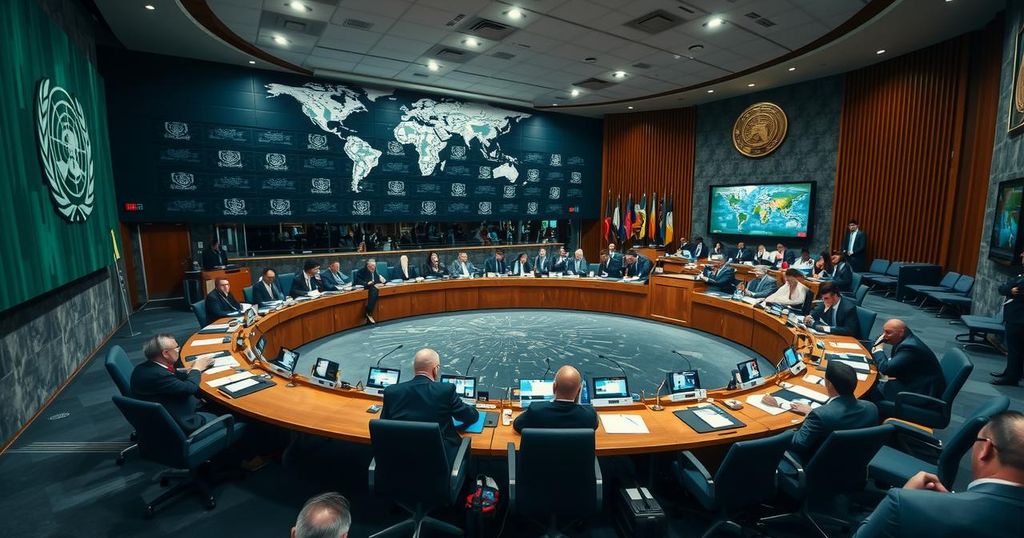Climate change
ARMENIA, ASIA, ASSOCIATION OF SMALL ISLAND STATES, AZERBAIJAN, BAKU, CHARLOTTE COOPER, CLIMATE CHANGE, CLIMATE JUSTICE, COLOMBIA, ENVIRONMENTAL POLICY, EUROPE/ASIA, FAT, GEOPOLITICS, GREENHOUSE GAS EMISSIONS, PA ' OLELEI LUTERU, PARIS AGREEMENT, REBECCA WALKERWOO, SOUTH AMERICA
Leila Ramsay
0 Comments
COP29: A Potential Turning Point for Peace and Climate Justice
COP29, set to begin in Baku on November 11, 2024, aims to establish a new global climate finance target. Azerbaijan’s presidency plans COP29 to focus on peace-related initiatives, including a truce during the conference. However, skepticism exists regarding the authenticity of these efforts due to the country’s contentious history and human rights issues. Activists argue for a genuine commitment that addresses military emissions and redirect military funds to climate action.
The upcoming COP29, scheduled to commence in Baku, Azerbaijan, on November 11, 2024, is anticipated to focus on a collective climate finance target as world leaders gather. In the past, specifically in 2009, developed nations set a commitment to provide $100 billion annually by 2020 to support developing countries in combating climate change. Ultimately, this goal was fulfilled in 2022, but much work remains to be done in addressing the urgent needs resulting from the climate crisis. In an interesting turn, Azerbaijan’s presidency has proposed that COP29 will embody the concept of a “COP of Peace.” This initiative includes a Climate and Peace Initiative aimed at ensuring climate finance reaches communities affected by armed conflict. Furthermore, there is a call for a temporary truce amidst ongoing conflicts during the month of COP29, akin to the Olympic Truce, recognizing that conflict exacerbates climate change. This appeal to cease hostilities acknowledges the dual crises of militarism and climate change, underscoring the need for profound and rapid transformation rather than superficial adjustments. However, civil society remains skeptical regarding Azerbaijan’s true motives, citing concerns around its poor human rights record and its reliance on fossil fuels. Critics argue that addressing militarism is essential for real change. A comprehensive COP of peace must engage with military emissions, which account for a significant percentage of global greenhouse gas emissions. Transparency in military contributions to climate change must be prioritized, and redirected military spending could support climate initiatives. In 2023, military expenditures escalated to $2.4 trillion—the same amount estimated necessary for aiding developing nations in renewable energy transition efforts. This situation raises pressing questions about the allocation of resources by wealthier nations that are both major historical emitters and military spenders. World leaders are urged to reconsider their expenditures on military enhancements and instead invest in restorative initiatives that prioritize planetary health and support communities on the frontlines of climate devastation. The COP29 presents a critical moment not only for climate negotiations but for establishing the framework of a peaceful future. Despite the challenges, there lies an opportunity for collective action and solidarity in addressing the intertwined crises of climate change and militarism. Activists are encouraged to advocate for greater accountability and engagement with policymakers, thereby fostering a unified community committed to climate justice and peace.
The United Nations climate change conference, known as COP29, is part of the ongoing global dialogue aimed at combating climate change and its effects. COP29 will focus on establishing new climate finance commitments and national emission reduction targets, marking it as a pivotal event for climate action. The conference’s unique framing as a “COP of Peace” attempts to address the intersections of conflict and climate issues, amid growing concerns over military expenditures overshadowing necessary climate investment. Through this framing, stakeholders are encouraged to reflect on the role of militarism in exacerbating climate challenges, and the framework for addressing these challenges through peace initiatives is being examined.
In conclusion, COP29 presents an important opportunity for world leaders to confront the intertwined challenges of climate change and militarism. Azerbaijan’s initiative to frame the conference as a “COP of Peace” is a significant step, albeit with skepticism from civil society regarding its genuine commitment to reforms. Real change necessitates transparency in military contributions to emissions, a reassessment of military spending, and a focus on community-driven climate finance. With the urgent need to transition towards a more sustainable future, it is imperative that leaders prioritize peace and accountability in addressing the impending climate crisis.
Original Source: www.quaker.org.uk




Post Comment